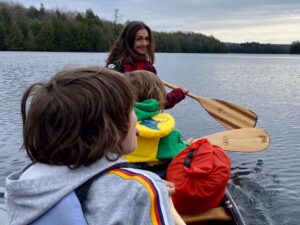This story is part of a series celebrating the 15 year partnership between The Dragonfly Fund and MakeWay. If you haven’t already, check out this interview with founder Annabelle White to learn more about the fund, the things she’s most proud of, and lessons she is taking with her into the next chapter of Dragonfly.
“Toxics is just as much of a human rights and social justice issue as it is an environmental health issue,” explains Heather Harding as we sit down to discuss Coalition for Action on Toxics (CAT) and the work they’ve done since we last spoke a few years ago.
This is a key moment in the fight for toxics reduction in Canada. Bill S-5, legislation to modernize the Canadian Environmental Protection Act (CEPA), has just passed its second reading in the House of Commons, a major milestone CAT has been working towards since it was established in 2016.
“Every day, Canadian’s face a barrage of toxic chemicals. Through our air, water, the products that we purchase, the chairs that we sit on, it’s everywhere, and Canada has an extremely outdated piece of legislation that governs how toxics are regulated,” she says. Amendments they are fighting for include: the recognition of a right to a healthy environment for all Canadians; recognition and protection of vulnerable populations; and the recognition of the cumulative effects of toxics in our environment.
“I feel confident that this bill will happen. The critical piece right now is continuing to move the legislation through the House, ensuring that the bill is further strengthened because we know that right now industry is full throttle trying to push back on the gains that have been made in the current legislation.”

Heather is the Project Director of CAT, which is now a project on MakeWay’s shared platform. The idea for the Coalition began when Bella White, founder of The Dragonfly Fund, a donor advised fund at MakeWay, identified a growing need for funding to fight toxics exposure in Canada.
“Initially, I funded clean energy and freshwater conservation, then started to question what is the root issue? What is polluting our waters? What are the issues with energy? I realized the fundamental issue is toxics: the poisons we are continuously putting into our air, water, and our bodies,” says Bella.
Her first grant went to procuring an environmental specialist and researcher to look into critically under-funded areas. What groups were already working on toxics reduction in Canada? Where could her funding make the most impact? The report came back with two clear findings: 1. Canada’s toxics policies are in need of a major overhaul, and 2. There were groups working on this, but they were often working separately and were severely under resourced. Based on the findings, Bella and MakeWay (then Tides Canada) brought together people and organizations working on toxics from across the country, and the idea for a coalition was born.
“When Bella came, she was really open minded in terms of how she wanted to address this,” says Heather. “Toxics doesn’t fall neatly into a philanthropic category like health or conservation, it’s more holistic than that. And policy work isn’t splashy, it is slow and happens in the background. Dragonfly and Bella didn’t care about a public-facing investment and trusted us to do the work. Their investment really has created the pathway for where we are now.”

Bill S-5 is currently in committee before going through its third and final reading in the House. When passed, the amended Bill will be the bases for how toxics are regulated in Canada. But CAT isn’t slowing down. “We still need to ensure that there is follow-through of how the bill is implemented and used,” explains Heather.
The next big piece of work for the Coalition is addressing the challenge of pesticide use in Canada. With the Pest Control Products Act up for review, they are working to leverage what they learned from CEPA to work on a strategy.
It’s slow “behind the scenes work” Heather calls it, but it is crucial. And having a funder like Dragonfly, who trusts the process and the people behind it is what makes it possible. “The care and consideration that has gone into the funding has been so important. Day to day the work of the Coalition is hard to quantify but this funding has allowed key health and environmental organizations to partner, work collectively, and share the expertise and resources needed to do this critical work. And those are the pieces that have really fallen into place to create the changes that we see in the reformed CEPA bill.”
After a 15-year partnership, The Dragonfly Fund is currently transitioning to its own foundation. Since opening the fund in 2008, they have granted over $10.7 million to initiatives working on issues ranging from protecting Canada’s water resources, to toxics elimination, to mental health and wellbeing, and much more. Read more about MakeWay’s partnership with Dragonfly over the years here.
Coalition for Action on Toxics is a project on MakeWay’s shared platform, which provides charitable expertise and operational support to a mission-aligned community of environmental and social initiatives. You can support CAT’s work by donating here.
